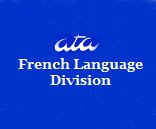 |
| Ellen Sowchek, Editor |
Greetings and Bienvenue from your new editor!
First impressions are very important, so I have been trying to find just the right topic with which to begin my inaugural blog posting as editor.
While reviewing the many possibilities, I read Grant Hamilton's posting on the FLD list giving some preliminary information for On traduit dans l'Estrie/Translate in the Townships, to be held August 19-23, 2012 in Orford, Quebec. This event, a continuation of Translate in the Catskills, organized by Chris Durban in 2009 and 2011, is a "must attend" for me and as a Catskills double-alumna I am greatly looking forward to it. Although there are many excellent continuing education opportunities for translators, this event is special: great presenters in a collegial environment together with wonderful colleagues, all of whom understand that good writing is a crucial aspect of good translation and a professional skill that merits, and even requires on-going development.
First impressions are very important, so I have been trying to find just the right topic with which to begin my inaugural blog posting as editor.
While reviewing the many possibilities, I read Grant Hamilton's posting on the FLD list giving some preliminary information for On traduit dans l'Estrie/Translate in the Townships, to be held August 19-23, 2012 in Orford, Quebec. This event, a continuation of Translate in the Catskills, organized by Chris Durban in 2009 and 2011, is a "must attend" for me and as a Catskills double-alumna I am greatly looking forward to it. Although there are many excellent continuing education opportunities for translators, this event is special: great presenters in a collegial environment together with wonderful colleagues, all of whom understand that good writing is a crucial aspect of good translation and a professional skill that merits, and even requires on-going development.
Good writing – the perfect topic for a blog!
I would like to begin with a full disclosure: I do not consider myself a "natural" writer. I do not have my own blog, I have never kept a diary, I do not write in a journal, and I have no plans to ever write my memoirs. I am not someone who lives to write (or who must write to live) and I am impressed and even somewhat awed by those who do. That is not me. Writing is hard work and I work very hard to make mine seem "natural" - to give it flow - for this is a quality I feel is essential for any writing to be considered good.
What do I do? One method that has worked for me is to force myself to write – not in my native language, which is American English, but in French, my working language. This may seem counterintuitive, but here is my rationale: as a translator working from French into English, my French comprehension skills are constantly improving, but my French writing skills risk becoming dormant. If I write more – and better – in French, I believe it ultimately improves the quality of my English translations. How do I do this? For the last fifteen years I have participated in an atelier d'écriture – a creative writing workshop in French, conducted by a teacher who is a native French-speaker and a pioneer in using creative writing as a pedagogical tool for language-learning. Our writing is guided: we are asked to write on a given topic, or in a specific genre, or in a particular author's style. Our work is shared, corrected, critiqued and developed. For me, it has been invaluable because it has taught me how to read (and write) a text from the inside out. By creating a text that flows in French, I also improve the quality of my writing in English. Although it takes time, I consider it a well-spent investment in my continuing professional development.
As translators, we follow the cardinal rule of working only into our own native language. Perhaps that is why I am fascinated by the idea of creative writing in a language that is not one's own and particularly by the number of writers who have chosen to do so in French. The first to come to mind is Samuel Beckett, who wrote plays in both English and French. There is Milan Kundera, who wrote his later works in French and then returned to his earlier works and translated them from Czech into French. In recent years, the Prix Goncourt, France's most important literary prize, has been awarded to several non-native speakers writing in French, among them Amin Maalouf (1993 for Le Rocher de Tanios, native language: Arabic), Andreï Makine (1995 for Le Testament français, native language: Russian), Jonathan Littell (2006 for Les Bienveillantes, native language: American English) and Atiq Rahimi (2008 for Syngué sabour: La Pierre de patience, native language: Persian).
Writing in French to improve one's writing in English – this is one approach I have tried. I am sure there are many others worth exploring. Do you have a specific method for improving writing skills that you would like to share? Examples of what is (and is not!) good writing in a translation? Please let me know. I would like this blog to serve as interactive meeting place for FLD members – it is your blog and I hope you will participate in providing its content. Consider it an opportunity to practice your writing skills!
A très bientôt!
Ellen Sowchek




